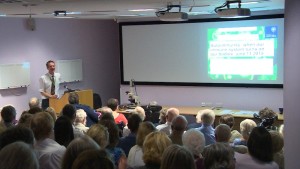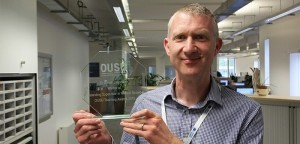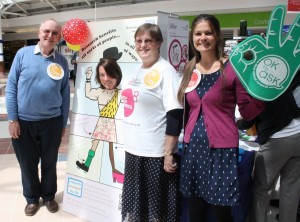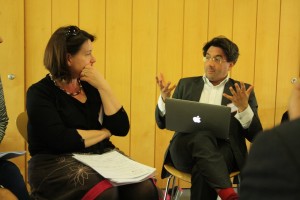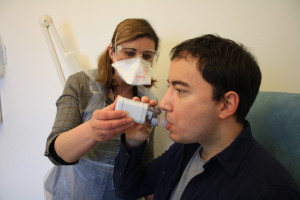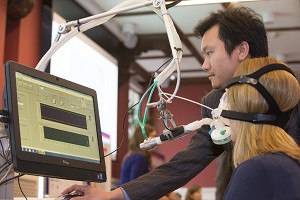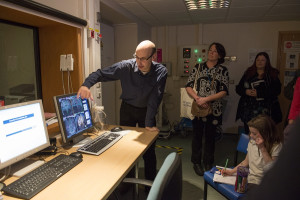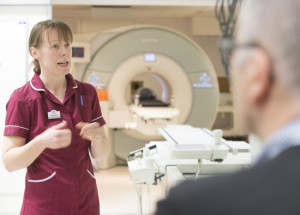The NIHR Oxford Biomedical Research Centre is among organisations supporting a conference in the city next month about the global response to Ebola. Researchers, Government leaders and industry professionals who led the worldwide fight against Ebola are to come together in Oxford for the first ... READ MORE
Immune system talk draws crowds
More than 100 people attended the latest BRC talk about the human immune system and how it can help and attack the body. The University of Oxford’s Professor Paul Bowness spoke on “Autoimmunity – when our immune system turns on our bodies” at the Nuffield Orthopaedic Centre, Headington, on ... READ MORE
BRC supports herpes virus cancer trial
THE NIHR Oxford Biomedical Research Centre has supported research that found a genetically engineered herpes virus can halt the progression of skin cancer. Patients from Oxford’s Churchill Hospital took part in the landmark clinical trial, which comprised 64 worldwide centres. It found the ... READ MORE
Nomination for BRC-backed blood project
A project supported by the NIHR Oxford Biomedical Research Centre has been nominated for a leading patient safety award. The Real-Time Blood Transfusion Data and Decision Support project has been nominated in the Technology and IT to Improve Patient Safety category for the Patient Safety Awards ... READ MORE
NIHR training lead honoured
The University of Oxford's Nuffield Department of Primary Care Health Sciences department lead for NIHR Academic Clinical Fellow training, Dr Daniel Lasserson, was honoured as 'Outstanding Supervisor in Medical Sciences' at the Oxford University Student's Union Teaching Awards at the Weston ... READ MORE
I’ll have a Pint of Science!
Pubgoers learned about the latest scientific developments at a Pint of Science event sponsored by the NIHR Oxford Biomedical Research Centre (BRC). The BRC supported the Pint of Science event at Oxford’s Wig and Pen on Tuesday May 19. Pint of Science brings together scientists to discuss their ... READ MORE
Event tells shoppers about research
SHOPPERS learned about medical research with an event at Templars Square Shopping Centre, Cowley, Oxford to mark International Clinical Trials Day. They spoke to patients, their relatives and NHS staff about how they can get involved in ground-breaking research for conditions like dementia and ... READ MORE
Audit success for BRC
In April 2015 the NIHR Oxford Biomedical Research Centre (BRC) operations team successfully participated in an external Audit by ACS Registrars Ltd (a UKAS Accredited Certification Body) resulting in the re-certification of the Internationally recognised business management system ISO 9001 ... READ MORE
Project brings Whole Genome Sequencing into the clinic
More than 10 years after the completion of the Human Genome Project doctors are a step closer to using whole genome sequencing to diagnose and treat patients with genetic diseases. This follows a study by researchers from the University of Oxford and the DNA sequencing company Illumina. Results ... READ MORE
Oxford shoppers to learn about medical research
SHOPPERS will be able to learn about clinical research with an event at Templars Square Shopping Centre, Cowley, Oxford on Wednesday May 20. They will be able to ask NHS staff about how they can get involved in ground-breaking research for conditions like dementia and diabetes at an information ... READ MORE
Campaign to raise awareness of research
The OK to ask campaign for this year has officially launched with the aim of encouraging more patients or carers to ask about research opportunities that could be available to them or their loved ones. Clinical research is thriving in the NHS with more than 600,000 patients taking part in ... READ MORE
Time taken to begin research among England’s best
OXFORD University Hospitals NHS Trust has been ranked among England’s best for the time taken to begin clinical trials involving new medicines and treatments. Oxford University Hospitals NHS Trust (OUH) is now ranked second out of the most research-active NHS Trusts for a key measure of how ... READ MORE
Volunteers sought for testosterone diabetes study
Men with Type 2 diabetes are needed for a study looking at a new treatment to correct low testosterone levels. Volunteers aged 18-60 would receive injections of a hormone which researchers from the Churchill Hospital in Oxford have found can boost the body’s production of ... READ MORE
First Health Economics Symposium for BRC
HOW cutting edge medical research can save the NHS money was the subject of the NIHR Oxford Biomedical Research Centre’s (BRC) first ever Health Economics Symposium. Oxford Hospitals NHS Trust and University of Oxford researchers met at St Catherine’s College, Oxford to evaluate how BRC-funded ... READ MORE
World-first TB vaccination trials enter next stage
THE first ever trials of an aerosol vaccination for tuberculosis in Oxford have shown promising results and volunteers are now being sought for further studies. University of Oxford researchers working at the Churchill Hospital found superior immune responses in the lungs from the trial of a ... READ MORE
Hundreds learn about pioneering Oxfordshire medical research
MORE than 500 visitors learned about ground-breaking medical research taking place in Oxfordshire at a series of events held by the NIHR Oxford Biomedical Research Centre (BRC) this month. From a vaccine for Ebola to bionic eyes to new ways to treat cancer, the seven events featured just some of ... READ MORE
John Radcliffe visitors see the brain in action
VISITORS and pupils learned how staff at the John Radcliffe Hospital study the brain as part of a series of public events about medical research in Oxfordshire. More than 100 people enjoyed a tour of the Oxford University Centre for Functional MRI of the Brain (FMRIB) on Monday March 16. They ... READ MORE
Scientists showcase search for a meningitis vaccine
THE FIGHT to tackle meningitis was highlighted at a Vaccines and Deadly Diseases Day. The all-day event for young people on Friday at Oxford University Museum of Natural History was part of this year’s Oxfordshire Science Festival. Among those taking part were Oxford University scientists ... READ MORE
Bionic eyes give us a look into future of medical technology
BIONIC eyes, lung imaging and pregnancy apps were part of an exhibition revealing life-changing research taking place in Oxford. Members of the public had a rare opportunity to meet surgeons, nurses and clinical researchers who are building the next generation of clinical techniques to ... READ MORE
Tour visitors learn about life saving research
Visitors to the John Radcliffe Hospital on Tuesday March 10 saw how people taken to hospital for acute vascular syndromes like heart attack and stroke are helping research to save lives. A total of 16 visitors attended a fully booked tour of the University of Oxford’s Acute Vascular Imaging Centre ... READ MORE
- « Previous Page
- 1
- …
- 36
- 37
- 38
- 39
- 40
- …
- 48
- Next Page »
